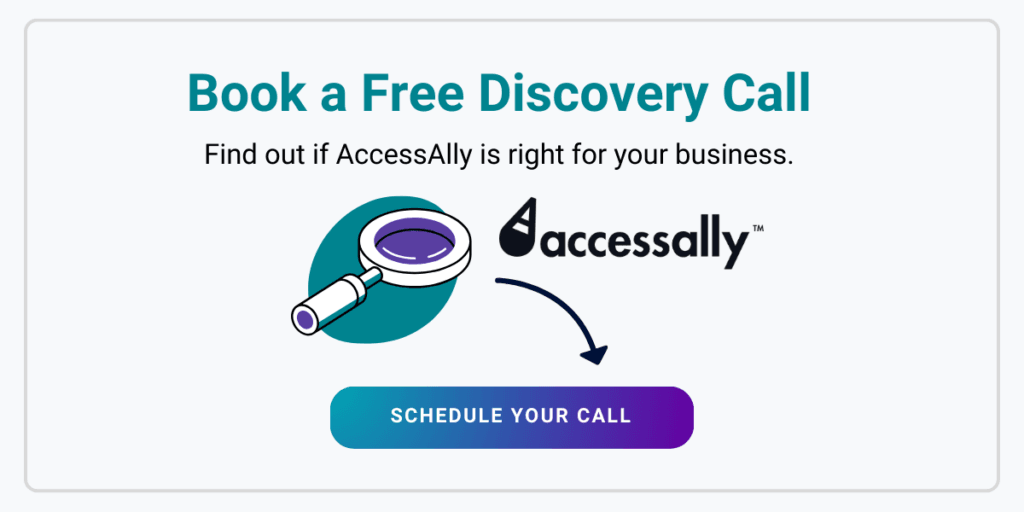As an online course creator interested in scaling your business, you’re probably looking for ways to scale your business and get your course to more people — and selling training courses to companies and corporations is a great solution.
Corporations have intense training demands because they’re looking for ways to enhance employee performance and well-being, improve onboarding, improve team building, and drive professional development. Corporate training programs and online learning have gained popularity among these organizations as an effective way to achieve these objectives.
Selling courses to companies is a great entrepreneurial opportunity — and a lucrative business prospect. Corporate clients are willing to pay premium prices, purchase multiple seats and make upfront payments.
Differences Between Selling Training Courses B2B vs. B2C
There are some big differences between selling training courses directly to learners (B2C, or business to customer) and selling them to a corporation (B2B, or business to business).
When selling training courses to a company, the focus is on contextualizing training programs to meet the needs of the organization. For example, any case studies or examples you use in a B2B course should be organization-specific to enhance a learner’s relevance and understanding.
You may need to rebrand, incorporate functionality for administrative users, and offer certifications tailored to the organization.
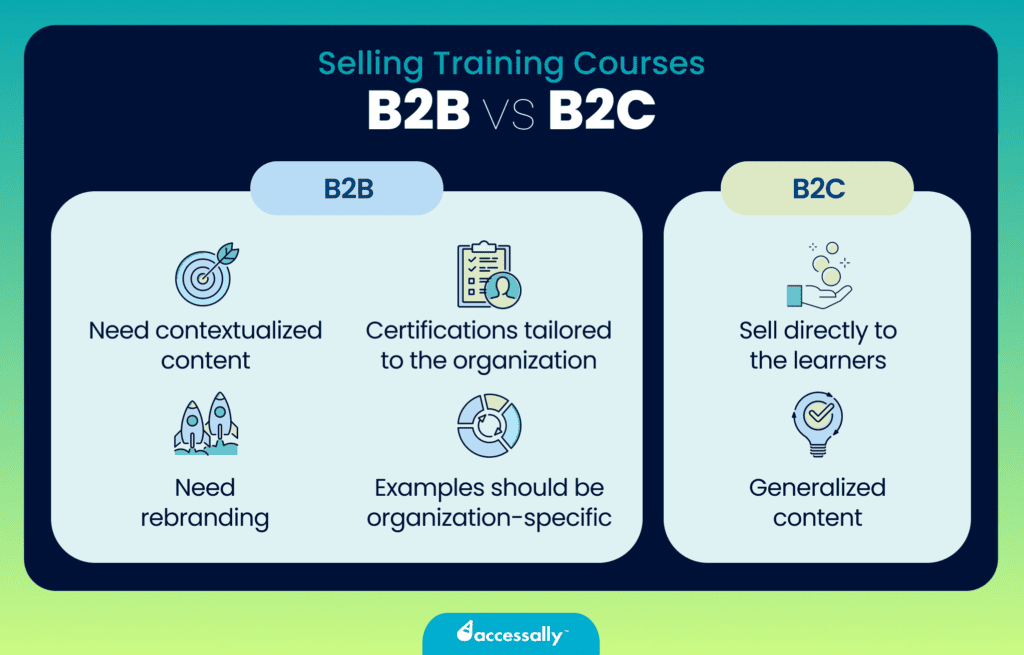

5 Benefits of Selling Training to Companies and Teams
There are many benefits to updating your business model to include selling trainings to larger corporations and organizations. You can increase your business’ revenue and revenue predictability. You can establish yourself as a recognized authority and build more long-term relationships. And you can get more strategic in your marketing process. Let’s look at each of these benefits.
1. Make More Money
Compare the effects of making a single course sale with selling training to a corporate company with ten team members: when you make one sale to a corporate company with 10 team members, you earn 10 times more than making one sale to an individual.
The corporate training market is large and expanding, so it’s a great opportunity for course creators. Plus, selling courses to corporations can help you upsell additional services to the same organizations, like offering small-group or even 1:1 coaching for leadership or management.
The change is transformational: instead of trying to achieve a large volume of single-client sales to meet your income goals, you only need a few corporate clients to make a big dent in your income goals.
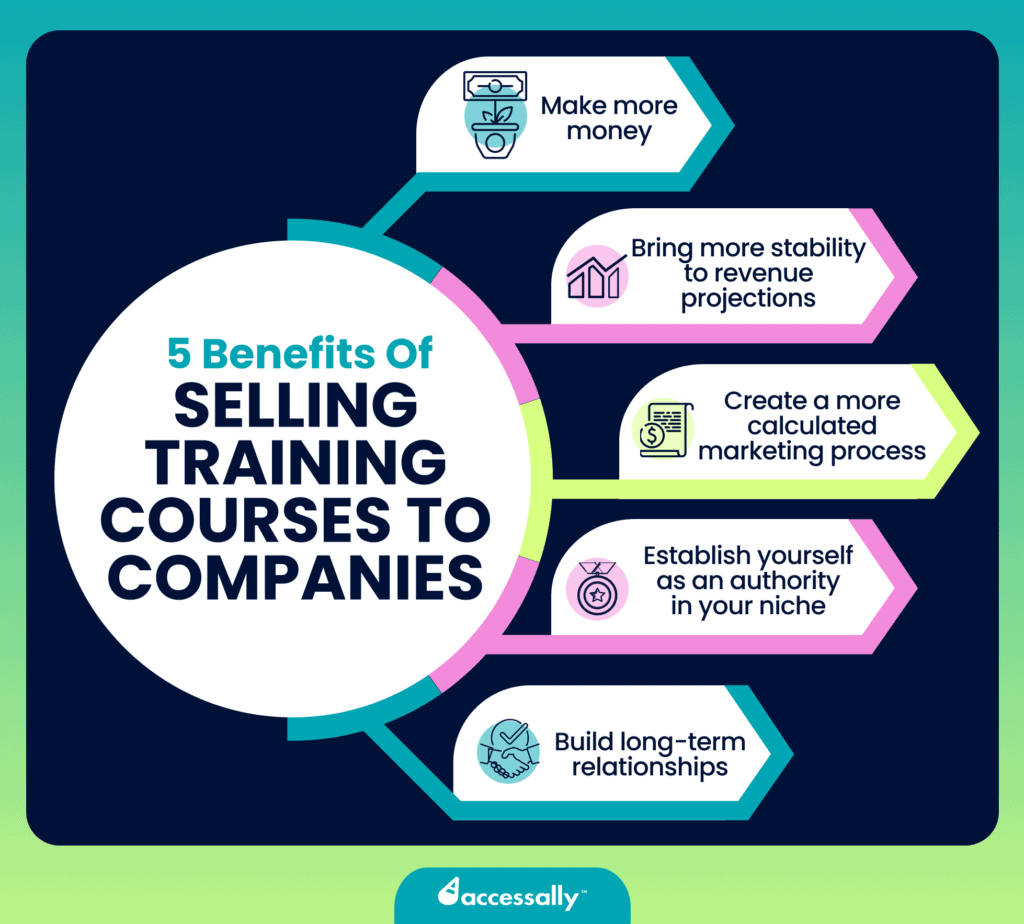

2. Bring More Stability in Revenue Projections
When you have the right positioning to focus on making big sales instead of smaller ones, it’s much easier to make (and reach) accurate goals.
For example, you might need 1,000 individual sales to reach your revenue goals, which would require your sales team to focus more on ways to reach a large volume of potential clients. Depending on your industry (and competition), this may not be feasible year after year.
If you’re marketing and selling training courses for 5-person corporate teams, you need only 200 sales to reach the same revenue goal. And if you can sell to 10-person teams, you only need 100 sales, and so on.
It’s a less daunting and more efficient way to project and attain your revenue needs.
3. Create a More Calculated Marketing Process
All marketing efforts find their success in a focused, calculated message.
But when you decide to license out your membership site to teams, you focus on a niche within your niche. The smaller your target clients, the easier it can be to identify the decision-making benefits and pain points they have.
The more you focus on the end customer, their pain points, and the benefits you offer, the more success you have in marketing and sales. Having a niche within a niche makes all that a lot easier.
4. Establish Yourself As an Authority in Your Niche
Selling training courses to companies gives you more authority in your niche, adds credibility to your business, and helps you enhance your reputation.
Your training methods and mentality might be the exact same, but positioning yourself a little higher on the playing field is a great way to keep building your brand’s reputation.
When you leverage this new positioning, you may be pleasantly surprised at some of the big players in your niche who would love to work with you. And as you attract those big players, be sure to collect testimonials and success stories from satisfied customers that will help you market your business effectively and draw in a broader clientele.
5. Build Long-Term Relationships
Engaging with corporate clients offers the opportunity to build long-term relationships that can potentially lead to recurring business and referrals. Selling to individuals usually means that it is a one-and-done transaction (unless you have multiple courses they can take over time). With corporate clients, they always have turnover, with new employees who will need the same training you sold them originally.
Delivering training programs of exceptional quality and efficacy can position you as a trusted advisor to your clients, establishing your reputation as a sought-after expert in your specific field.
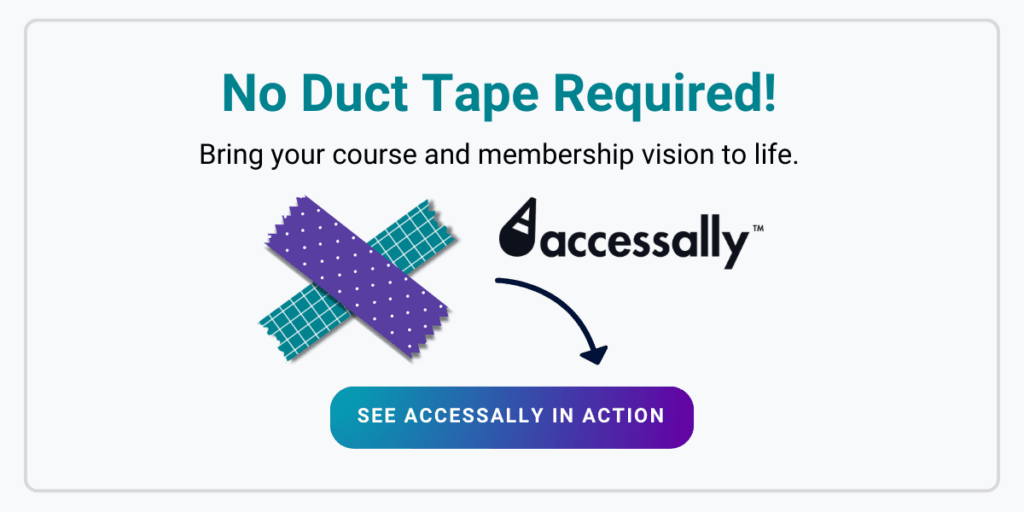

What are Corporate Clients Interested In?
If you’re aiming to sell your course to companies, the first thing to do is make sure your course looks and feels polished and professional.
This also means having impressive landing pages that convey the value and benefits of your course. Everything from inside your actual course to all of your sales and digital marketing materials should give a top-notch first impression to attract corporate clients.
This foundational approach will set you up for future sales success.
That’s because when corporate clients consider investing in your online learning courses, they’re evaluating not only the content but also the credibility of the source.
A polished appearance suggests a level of dedication and expertise that aligns with the corporate world’s standards.
Here are some key topics that medium and large companies are always investing in:
- Leadership and management coaching
- Customer Service Excellence
- Virtual sales training programs
- Business Intelligence
- Compliance training
- Soft skills training
- Communication skills
- Time management
In essence, anything that can help them improve the skill levels and performance of their employees, optimize their sales cycle, or bridge key company gaps.
How to Sell Training Courses to Companies in 6 Steps
It can be daunting to think about trying to sell your online courses to companies and corporations, so we’ve broken down the process into six steps you can follow to help ensure success.
1. Make Sure You Have the Right Offer
Although not every online training course or membership site can be packaged and sold to corporate teams, most can with just a little bit of work.
The good news is that it’s often not the content itself that needs to be tweaked – but the management side of things.
For example, corporate clients’ business objectives (whether that’s businesses with large teams, realtor associations, or any industry where a group of professionals works together) extend beyond the actual course material. They’re also looking for three things:
1. Ease of sharing training with their team members
Is it easy to share the material with their team members? Does each person get a unique login? Can the team leader control access – or delete someone if they leave the company?
2. Ability to track team member progress
If your course is focused on corporate training, many team leaders would love to see how their company’s users are actually progressing through the course.


Are they completing the course material? Do they understand it?
Providing the right statistics and user tracking is a game-changer for your corporate clients.
3. Ease of purchasing new licenses
A client might start off with a basic 5-person membership subscription, but after realizing how amazing your content is, they want to add more team members.
Giving them the flexibility to do this automatically (i.e. without having to put in a phone call to your customer support) is a huge bonus to busy clients who don’t have a ton of time to spare during the workday.
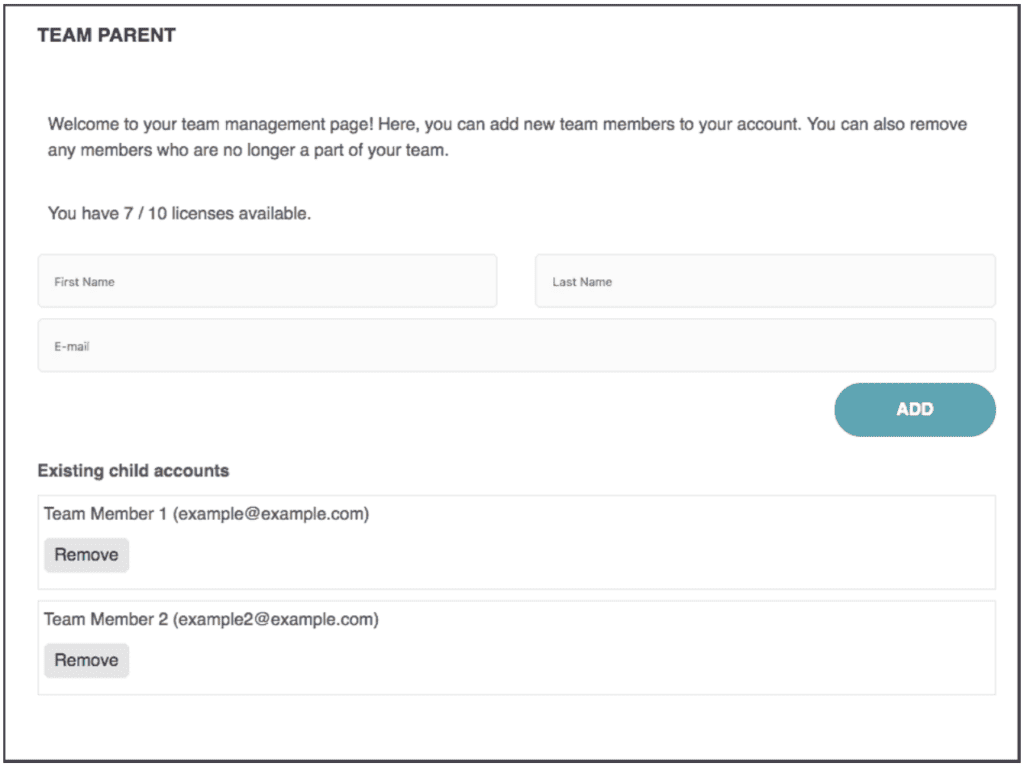

2. Create Packages & Price Your Offer
There’s no one-size-fits-all pricing solution for corporate clients; it will vary across businesses and industries.
It is always a good idea to research competitors’ rates for similar courses for benchmarking. How are your offers similar and how are they different?
The delivery method also impacts pricing. For example, an in-person workshop will almost always cost more than an online course. A small-group offer with lots of interaction will cost more than a large course with minimal interaction, and so on.
Consider a per-head rate with bulk discounts for larger quantities or unlimited users that will appeal to organizations with large teams.
3. Choose the Best Platform to Sell Training Courses to Companies
For effective training delivery to companies, it’s essential to have a software platform, because without an e-learning platform, training courses are limited to manual access or in-person training. Those manual approaches — that might include time-consuming emailing or cloud-based downloads — are considered inefficient and outdated.
Companies outsource for convenience, comprehensive reporting, and a unified internet-accessible platform for global employee participation that can be accessed from anywhere on any device.
The essential solution for these requirements is an LMS (learning management system), designed for professional development and online training management. There are three main types of learning management systems, which we go over in-depth in this article.
We’ve also developed this decision tree to help you decide what platform you should use for your online course when selling to corporate clients:
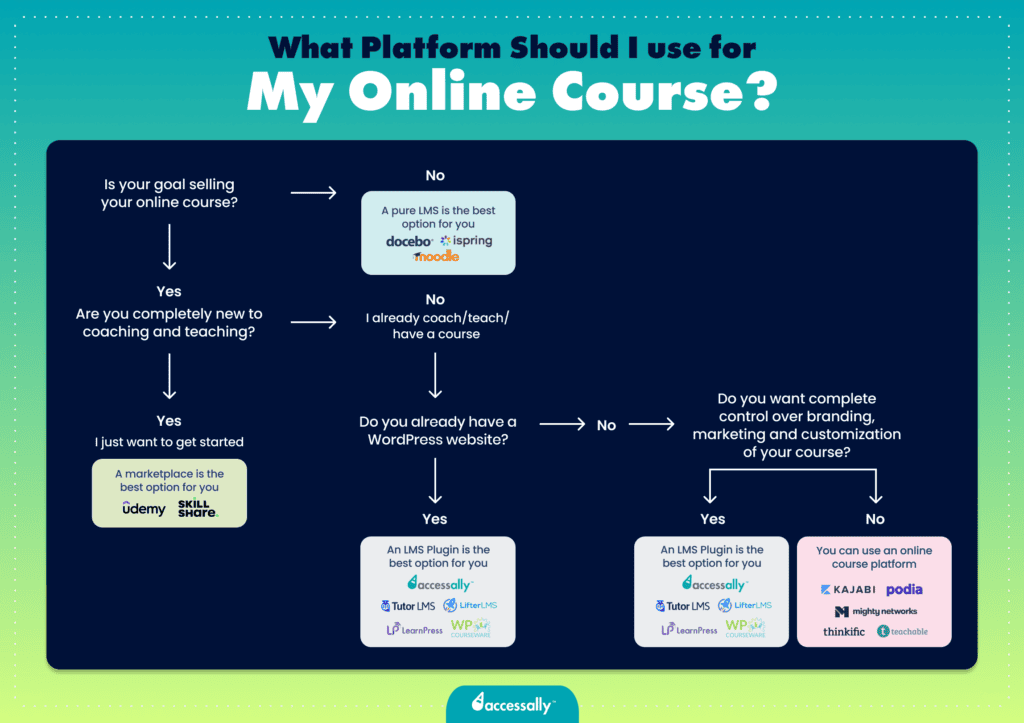

One great way to sell training courses to companies is to use a WordPress LMS plugin like AccessAlly, because it offers easy bulk course enrollment and licensing options for when you start selling your online courses to corporate clients and teams while offering complete control over how you build, brand, and structure your courses.
Making sure you have the technology in place to deliver on your promises is crucial to sell training courses to companies.
4. Market Your Training Course to Companies and Training Teams
Once you start including corporate training in your business model, you’ll want to diversify your marketing channels to sell to companies (e.g. email marketing, Google Ads, YouTube, etc.). The decision makers for corporations will be spending time in different places from your individual learners, and so you will want to expand your marketing to include them. They may also be interested in different messages than your individual learners, so try customizing your marketing messages to reach them.
Creating an outreach email campaign should be an essential part of your marketing strategy. This means finding the decision makers at companies you want to work with and reaching out to them to better understand their training needs and to introduce your business as a solution. LinkedIn can be a great resource both for finding the right person at the companies you want to reach and for sending initial messages.
Finally, you should carefully write your training proposals and customize them for each organization. Having an outline can help you make this process easier, since you’ll be sending many of them to different businesses when selling your courses in a B2B context.
5. Show Social Proof
Businesses don’t want to hear fancy language or promises. They want to see results.
Always showcase other companies who have benefited from your training in the form of powerful, numbers-based testimonials.
This is a key difference between selling training to individuals and smaller businesses and selling to larger corporations.
With a smaller business, testimonials like “My team LOVED working with Sarah, and we noticed such a difference in the confidence of our sales team after taking her course” are just fine.
Larger corporations wouldn’t bat an eye at a testimonial unless they see concrete evidence through words, like “After our sales team took Sarah’s course, they increased their closing percentage by 15%, leading to a 30% increase in revenue.”
Also, remember that the testimonial that you receive from a single client – if they’re big enough – can influence a dozen other decision-makers to also buy from you.
6. Follow-up and Be Persistent With Your Prospective Customers
Be aggressive.
I repeat: be very aggressive.
Following up with corporate clients is a bit different from your individual or one-off training sales reps.
There’s a plethora of reasons why this is the case:
- You have to be heard above all the noise out there,
- They’re busy, and your sales pitch might not be top of mind for them,
- If you’re not on paper or on their calendar, you can easily be forgotten… forever,
- Your competition is out there, too.
Keep in mind that being aggressive does not mean that you toss out the human element. It’s a tough balance for the best of copywriters, but you have to be personable, likable, and persistent enough to make a hard sell.
5 Mistakes to Avoid When Selling Training to Corporate Clients
Now that you know what you should do when starting to sell to corporate clients, let’s look at a few things you should avoid:
1. Not Doing Your Homework
Imagine entering a meeting with a prospective client armed only with surface-level knowledge. The momentary excitement might be overshadowed by the unmistakable signs of unpreparedness.
In an era where information is readily accessible, clients are more discerning than ever, often conducting thorough research on their own.
If you meet with a client, and you are unprepared, it will show. Especially since this client is more likely than not researching you and all your course has to offer; you need to establish a good connection with customers from day one.
2. Not Getting Access to Decision-Makers
It is important to understand that even though a professional might like your course, that does not mean that they have the power to persuade their company to buy it. Therefore, you need to make sure you are selling to the people that make the purchasing decisions.
By engaging key budget holders from the beginning, you not only expedite the sales decision-making process but also ensure that your efforts are channeled toward individuals who hold the reins of authority.
3. Misunderstanding Your Value
Your prospects will probably start the process with a vision of what they think your worth is. Don’t let them.
One common stumbling block in the selling process to corporate clients is the potential misinterpretation of your value proposition.
As you engage with prospects, it’s crucial to recognize that they may come into the process with preconceived notions about the worth of your training.
However, it’s essential not to let these initial perceptions define your value.
While your prospects may have a certain estimation of your value, it’s essential to remember that you possess the most comprehensive understanding of the intricate work, strategic insights, and overarching financial benefits that your training can offer to their organization.
4. Not Understanding Your Buyer’s Perspective
One notable pitfall to avoid is underestimating the importance of putting yourself in your potential buyer’s perspective.
This is one of the most important sales skills, regardless of whether you are selling a simple course, virtual training program, or onsite training.
For instance, imagine pitching a comprehensive suite of sales training courses to a company that deeply values collaborative decision-making and teamwork.
However, if your training materials predominantly emphasize individual achievement and competition, it’s highly likely that your message will fall flat.
5. Neglecting Data and Analytics
Businesses are always looking for ways to improve their decision-making through data-driven decisions, and neglecting to integrate reports or dashboards into your training course can damage its appeal to corporate clients.
By incorporating data analytics tools and emphasizing the ability to measure the course’s ROI, you elevate its value proposition and demonstrate your commitment to driving measurable improvements within their organization.
As you can see, selling online courses to corporate clients can be lucrative and have lots of benefits for your business — but it isn’t as easy as just declaring that you now sell corporate training. There are lots of things to consider and have set up before you approach your first corporate dream client, but when you do you due diligence and set up your courses to scale, you’ll have access to an incredible opportunity to grow your revenue, increase your reputation, and scale your online courses.
